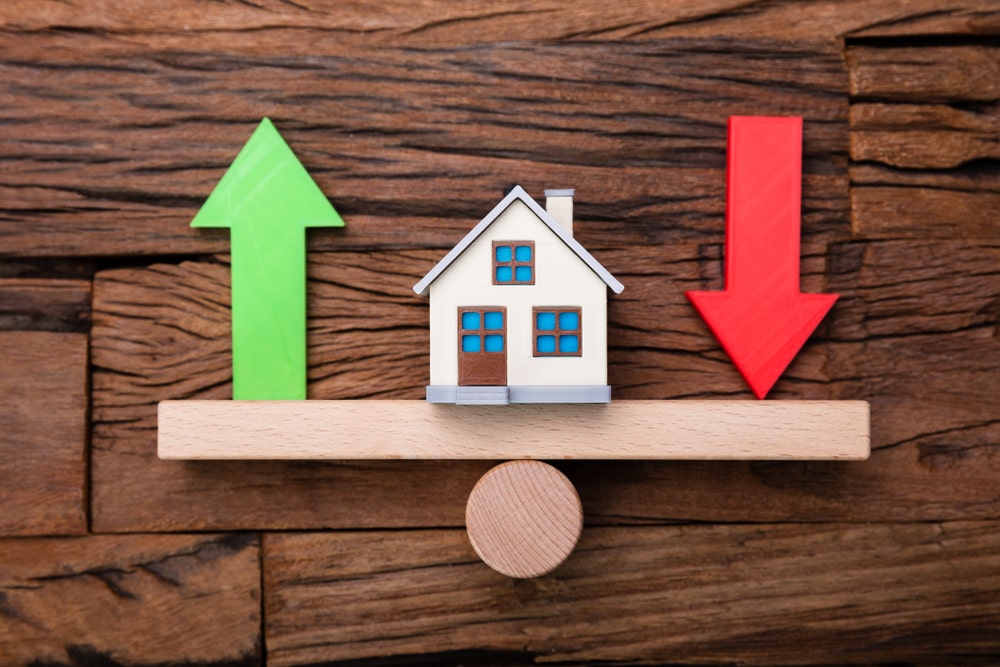With high mortgage rates and even higher home prices, many homebuyers witnessed their hopes sink faster than the Titanic. In fact, in Fannie Mae’s most recent National Housing Survey, only 20% of consumers said it’s a good time to buy a new home.
Home prices increased by 6.49% year over year in March 2024, according to the latest S&P CoreLogic Case-Shiller Home Price Index. On top of that, many housing market forecasters think these prices will increase by the end of 2024.
For any potential buyers on the sideline, this might represent bad news. In 2024, homebuyers might mark increased competition and multiple offers on homes, driving up prices even further. What’s worse, the ever-challenging housing market has plenty of potential buyers who wonder on a daily basis if home prices will ever go down, or if they’re expected to crash in the future.
Some of them are hoping for a housing market crash. According to a survey conducted by LendingTree, 44% of Americans think that the housing market might crash this year, and more than one-third of them started to wish for the market to crash, thinking it’s their only chance to buy a home.
So the question is: is there any chance for the housing market to crash anytime soon? And if so, will that make homes more affordable for first-time homebuyers?

What are the chances?
Even if many Americans think that the housing market is at high risk of crashing, the economists who continuously study housing market conditions wouldn’t bet on a crash by the end of the year or the next one, for that matter. The latest housing market predictions for 2024 from some of the top industry groups noticed home prices increasing somewhere between 2% to 4.8% this year.
Understanding housing market dynamics
Why are economists so certain that home prices won’t crash? Well, first of all, there’s not enough supply. Considering the economics of supply and demand, if there’s any shortage, prices can’t crash.
The US is currently somewhere between 2.3 million and 6.5 million units short of a healthy housing supply. Even if something could have happened to convince so many homebuyers to drop out of the market, demand still couldn’t drop low enough to push prices down so much.
The current state of the housing market
It might be quite understandable that some hopeful buyers feel their only chance to become homeowners is for the market to completely tumble down, but what they don’t realize is that the last crash is part of how we got into this situation in the first place.
How the last housing market crash made room for nowadays conditions
In the mid-2000s, plenty of lenders were offering all sorts of mortgages to high-risk borrowers, without properly asking for documentation. At the same time, home builders were building new homes on fast forward, so they could meet increasing demand.
Home builders were building from scratch right and left, so no wonder we look back and define it as one of the most active supply-producing situations. But in this context, we automatically talk about an oversupply.
When the housing market crashed, which led to the Great Recession, it also destroyed the entire home-building industry. Many companies went bankrupt, and many builders decided to leave their jobs in other industries.
In the years that followed the infamous recession, the industry struggled to recover, and a couple of homes were built as a result. Now, more than a decade after the end of the Great Recession, homebuyers still feel the effects of the last crash.
Predicting a housing market crash
Housing market crashes generally take place when there’s an effective imbalance of supply and demand. However, there are plenty of things that might cause this type of imbalance, which also makes crashes quite hard to predict.
How low demand can cause a housing market crash?
A sudden drop in homebuying demand can automatically lead to a housing market crash. This can take place if there are many would-be buyers who lost their jobs during the recession and can’t afford anymore to buy a house.
If no one is buying houses, then home values plummet. Lower demand also takes place when mortgage rates are too high. Naturally, this alone isn’t enough to cause a crash in prices. However, if supply is also relatively high, a moderate drop in demand might cause home prices to go down.
How an increase in supply might cause a housing market crash
Even if it might be hard to envision it in the current market, it’s also fairly possible to have an oversupply of homes. This can also happen if builders construct way too many homes in a certain area, or if an economic downturn forces many owners to lose their homes to foreclosure.
In this particular scenario, not only would plenty of new homes be released onto the market faster, but the economic conditions might also block other buyers from purchasing those vacant homes. Shifts in supply or demand don’t always imply a crash is right around the corner. Prices can easily plateau or dip slightly without actually crashing.
What does a housing market crash represent for homebuyers
Anything is possible, to be fair, and nobody has a crystal ball tucked in their jacket to see what can really happen in the housing market in the upcoming months and years. If the market were to crash, would that make it easier for some to purchase a home?
It’s possible, yes, but it also depends on what caused the crash in the first place. If it’s anything similar to the last one, where plenty of workers lost their jobs, taking advantage of lower home prices won’t be possible for many homebuyers. And given the current supply conditions, it’s also very unlikely to see prices fall so much without there being a larger economic fallout.

Preparing for a potential housing market crash
At the moment, you probably don’t need to prepare for the housing market to crash. However, if you are wondering what you can do to put yourself in a good spot if a crash takes place sometime in the near future, here are some things you should keep in mind.
First, you want to keep an emergency fund. You never know when you need one of these! Then, make sure you don’t buy more house than you can afford (as funky as that sounds, you know what we mean).
Then, aim for a fixed-rate mortgage, so you won’t have to worry about your payment going all the way up. Last but not least, increase your down payment to make sure you still have some equity in your home.
How to purchase a home in a challenging market
Instead of hoping to spot lower prices, there are a couple of more efficient things you could try to achieve your homeownership dreams this year.
Expand your search
If you know you can’t afford to buy in the city you currently live in, you should try to look somewhere else. Why not? You can talk to a local real estate agent and find out if you can find more affordability a bit far away.
In most cases, average home prices can differ a great deal from one zip code to the next. The only thing you should keep in mind is to consider other factors before you move to a brand new area, such as your commuting route to work and whether or not you want to be in a certain school district.
If you live in a high-cost metro area, moving out of the city might make homeownership a lot more affordable. For those of you who benefit from some degree of flexibility to go further out into the suburbs, exurbs, or even smaller towns, there’s also better affordability. That’s a fact.
Wait for mortgage rates to fall
The only good news for homebuyers is that mortgage rates are definitely expected to go down later this year. In fact, it’s unlikely to see a return to the historic lows borrowers knew in 2020 and 2021.
According to the latest forecast, 30-year fixed rates might inch down throughout the next couple of years. Lower mortgage rates also mean more people will be able to afford to buy a home. As rates drop, you could potentially save hundreds of dollars per month on your mortgage payment.
Get as much help as you can
Mortgage lenders are offering increasingly more incentives to entice prospective borrowers, and plenty of best mortgage lenders who aim for first-time buyers offer all kinds of things such as down payment assistance or even interest-rate buydowns to help borrowers get the home of their dreams.
If you found this article insightful, we also recommend checking What Social Security Tasks Can I Do Online? (These 12 Ones)









